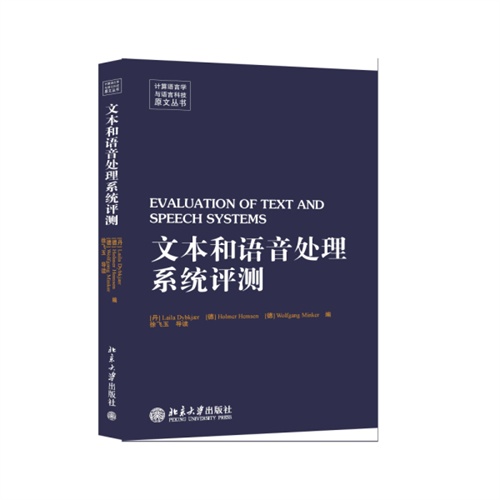暂无评论
图文详情
- ISBN:9787301249512
- 装帧:一般胶版纸
- 册数:暂无
- 重量:暂无
- 开本:16开
- 页数:288
- 出版时间:2014-12-01
- 条形码:9787301249512 ; 978-7-301-24951-2
本书特色
《文本和语音处理系统评测(英文影印版)》是"计算语言学与语言科技原文丛书"中的一册。文本和语音系统是计算语言学和语言技术的主要应用方向,涉及的范围非常广泛,几乎包括所有的语言技术应用系统。本书涵盖的内容非常丰富,既详细介绍了各种文本和语音系统及其评测的基础理论,又结合大量实例针对系统评测进行了明确的说明和解释。内容深入浅出,适合有一定背景知识的初学者或相关领域的科研工作者阅读,也可作为计算语言学专业教材。
内容简介
《文本和语音处理系统评测(英文影印版)》内容深入浅出,适合有一定背景知识的初学者或相关领域的科研工作者阅读,也可作为计算语言学专业教材。
目录
导读
preface
contributing authors
introduction
laila dybkj?r, holmer hemsen and wolfgang minker
1 speech and speaker recognition evaluation
sadaoki furui
1. introduction
2. principles of speech recognition
3. categories of speech recognition tasks
4. evaluation of speech recognition systems
5. principles of speaker recognition
6. categories of speaker recognition tasks
7. normalization and adaptation techniques
8. evaluation of speaker recognition systems
9. factors affecting the performance and evaluation paradigm
design for speech and speaker recognition systems
10. svstem-level evaluation of speech and speaker rognition…
11. conclusion
references
2 evaluation of speech synthesis
nick campbell
1. introduction
2. components of computer speech
3. evaluation methodologies
4. organised evaluations and assessment
5. speaking to (and on behalf of) people
6. conclusion
references
3 modelling and evaluating verbal and non-verbal
communication in talking animated interface agents
bj?rn granstr?m and david house
1. introduction
2. kth parametric multimodal speech synthesis
3. data collection and data-driven visual synthesis
4. evaluating intelligibility and information presentation
5. evaluating visual cues for prominence
6. evaluating prosody and interaction
7. evaluating visual cues to sentence mode
8. evaluation of agent expressiveness and attitude
9. agent and system evaluation studies
10. future challenges in modelling and evaluation
references
4 evaluating part-of-speech tagging and parsing
patrick paroubek
1. pos tagging
2. parsing
3. evaluation and natural language processing
4. pos tagging evaluation methodology
5. methodology and evaluation measures for parsing
6. conclusion
references
5 general principles of user-oriented evaluation
margaret king
1. a historical note
2. what is user-oriented evaluation?
3. a first principle: quality is decided by users
4. a second principle: users do not have the same needs
5. a third principle: quality can be characterized
6. a fourth principle: quality can be measured
7. combining the particular and the general: the ideal
8. conclusion
references
6 an overview of evaluation methods in trec ad hoc info-
rmation retrieval and trec question answering…
simone teufel
1. introduction
2. evaluation criteria
3. evaluation metrics
4. real-world performance
5. conclusion
references
7 spoken dialogue systems evaluation
niels ole bernsen, laila dybkj?r and wolfgang minker
1. introduction
2. evaluation methods and criteria
3. evaluation of the nice hans christian andersen prototype
4. evaluation of the seneca prototype
5. conclusion
references
8 linguistic resources, development,and evaluation of…
text and speech systems
christopher cieri
1. introduction
2. the linguistic resource landscape
3. background on linguistic data and annotation
4. data planning for technology development and evaluation
5. finding resources
6. building resources
7. conclusion
references
9 towards international standards for language
resources
nancy ide and laurent romary
1. introduction
2. background
3. the linguistic annotation framework
4. putting it all together
5. conclusion
references
index
preface
contributing authors
introduction
laila dybkj?r, holmer hemsen and wolfgang minker
1 speech and speaker recognition evaluation
sadaoki furui
1. introduction
2. principles of speech recognition
3. categories of speech recognition tasks
4. evaluation of speech recognition systems
5. principles of speaker recognition
6. categories of speaker recognition tasks
7. normalization and adaptation techniques
8. evaluation of speaker recognition systems
9. factors affecting the performance and evaluation paradigm
design for speech and speaker recognition systems
10. svstem-level evaluation of speech and speaker rognition…
11. conclusion
references
2 evaluation of speech synthesis
nick campbell
1. introduction
2. components of computer speech
3. evaluation methodologies
4. organised evaluations and assessment
5. speaking to (and on behalf of) people
6. conclusion
references
3 modelling and evaluating verbal and non-verbal
communication in talking animated interface agents
bj?rn granstr?m and david house
1. introduction
2. kth parametric multimodal speech synthesis
3. data collection and data-driven visual synthesis
4. evaluating intelligibility and information presentation
5. evaluating visual cues for prominence
6. evaluating prosody and interaction
7. evaluating visual cues to sentence mode
8. evaluation of agent expressiveness and attitude
9. agent and system evaluation studies
10. future challenges in modelling and evaluation
references
4 evaluating part-of-speech tagging and parsing
patrick paroubek
1. pos tagging
2. parsing
3. evaluation and natural language processing
4. pos tagging evaluation methodology
5. methodology and evaluation measures for parsing
6. conclusion
references
5 general principles of user-oriented evaluation
margaret king
1. a historical note
2. what is user-oriented evaluation?
3. a first principle: quality is decided by users
4. a second principle: users do not have the same needs
5. a third principle: quality can be characterized
6. a fourth principle: quality can be measured
7. combining the particular and the general: the ideal
8. conclusion
references
6 an overview of evaluation methods in trec ad hoc info-
rmation retrieval and trec question answering…
simone teufel
1. introduction
2. evaluation criteria
3. evaluation metrics
4. real-world performance
5. conclusion
references
7 spoken dialogue systems evaluation
niels ole bernsen, laila dybkj?r and wolfgang minker
1. introduction
2. evaluation methods and criteria
3. evaluation of the nice hans christian andersen prototype
4. evaluation of the seneca prototype
5. conclusion
references
8 linguistic resources, development,and evaluation of…
text and speech systems
christopher cieri
1. introduction
2. the linguistic resource landscape
3. background on linguistic data and annotation
4. data planning for technology development and evaluation
5. finding resources
6. building resources
7. conclusion
references
9 towards international standards for language
resources
nancy ide and laurent romary
1. introduction
2. background
3. the linguistic annotation framework
4. putting it all together
5. conclusion
references
index
展开全部
本类五星书
本类畅销
-

蛤蟆先生去看心理医生
¥26.6¥38.0 -

世界尽头的咖啡馆
¥18.0¥45.0 -

咬文嚼字二百问
¥9.6¥32.0 -

从零开始的女性主义
¥30.3¥52.0 -

字海探源
¥23.4¥78.0 -

乡土中国
¥14.6¥26.0 -

《标点符号用法》解读
¥6.2¥15.0 -

与内心的恐惧对话:摆脱来自亲人的负能量
¥34.1¥48.0 -

你能写出好故事-写作的诀窍.大脑的奥秘.认知的陷阱
¥9.8¥32.8 -

社会学:原来这么有趣有用
¥9.1¥36.0 -

中国人的精神
¥9.9¥29.0 -

焦虑心理学:不畏惧、不逃避,和压力做朋友
¥11.4¥38.0 -

理解生命
¥10.5¥32.8 -

乌合之众:大众心理研究
¥12.1¥36.8 -

从白大褂到病号服:探索医疗中的人性落差
¥12.7¥39.8 -

非暴力沟通心理学 : 用非暴力沟通化解冲突
¥9.0¥36.0 -

上大演讲录(1922-1927卷)(九品)
¥14.0¥52.0 -

那时的大学
¥8.4¥28.0 -

始于极限:女性主义往复书简(八品)
¥22.4¥59.0 -

汉字王国
¥11.5¥46.0













